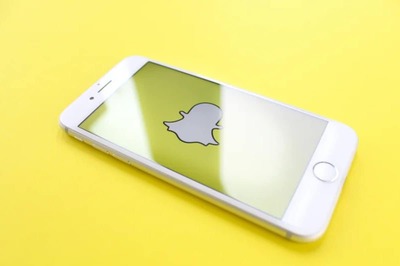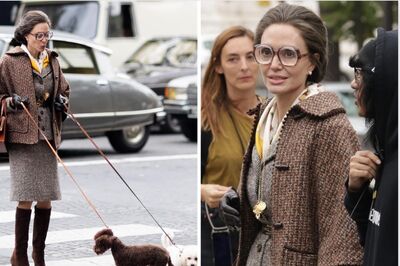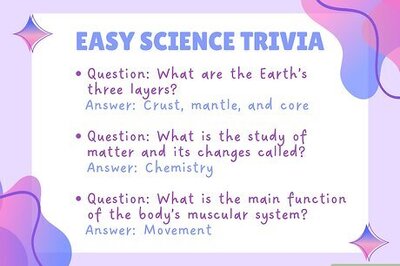
views
Aight
“Aight” is an informal way to say “all right.” Pronounced as ah-ahyt, this slang term became popular in the ‘90s after originating in Black English through hip-hop music and culture. “Aight” (also spelled as “aiight” and “ight”) can be used in the same way that you’d use “all right.” In the ‘90s, it was common to ask someone if they were “all right” or “okay” by using this slangy phrase, but it could also be used as a filler word, an adjective, or a way to express affirmative approval like “yes” or “sounds good.” Examples: “Aight, I’ll meet you there.” “These shoes are aight.” “You feeling aight?” Will Smith raps this phrase in the song “I'm Looking for the One (To Be With Me.”
All that and a bag of chips
“All that and a bag of chips” implies that someone is arrogant or conceited. To be “all that” generally means to be amazing (or “da bomb,” as a 90s kid would say). So, being “all that and a bag of chips” might mean that someone is “all that” plus a little bit more—just like how a bag of chips is that extra treat used to round out a perfect meal deal. While this phrase can be used as a compliment, it was usually used in the ‘90s to criticize boastful or vain people who THOUGHT that they were “all that and a bag of chips.” Examples: “He’s got such a superiority complex, he really thinks he’s all that and a bag of chips.” “I’m really digging her vibe. She’s all that and a bag of chips!” “You ain’t all that and a bag of potato chips.” Dr. Evil says this to the president in Austin Powers: The Spy Who Shagged Me (1999).
As if!
“As if!” is a humorous way to express disbelief. “As if!” can be used as a humorous retort to show that you don’t believe that something is possible or that you believe the opposite of what is being said. The slangy exclamation became popular through the the 1995 movie Clueless, although writer-director Amy Heckerling credits the LGBTQIA+ community with coining and first using the term. Examples: “He got a raise? As if!” “I’m going to apologize to her? As if!” “Ew, get off of me! Ugh, as if!” Cher Horowitz says this in Clueless when a boy she’s not interested in tries to grab her.
Bling!
“Bling!” is a slang term for expensive, flashy jewelry. If someone’s looking to get blinged out, they’re likely loaded up with a bunch of shiny necklaces, bracelets, chains, and other glitzy accessories. This term is also associated with people who like to show off their wealth through flashy bling (!), like B.G. does in his 1999 track “Bling Bling.” This hip-hop song is largely credited with popularizing this term as an essential piece of 90s slang. Examples: “He turned up all iced out with lots of bling.” “That gold chain is a little too bling for my taste.” “Bling bling, pinky ring worth about fifty.” B.G. sings this line in the song “Bling Bling.”
Booyah
“Booyah” is an interjection expressing satisfaction or accomplishment. You might shout “Booyah!” when something joyful, victorious, or exciting happens—like landing a sick skateboarding trick or leading your basketball team to win the state championship. It’s believed that “booyah” was first used by the California rap community to imitate the sound of gunfire, but it was widely popularized by ESPN sportscaster Stuart Scott. Examples: “Booyah! What a goal!” “That was amazing, dude! Boo-yah!” “We’re unstoppable! Booya!”
Cha-ching
“Cha-ching” is used to say that someone’s gotten a large sum of money. As an exclamation, “cha-ching” (or “ka-ching”) is meant to sound like the sound of a cash register when a dollar amount is entered—sort of like a bell or chime sound. In the ‘90s, the onomatopoeic phrase was at least partially popularized by Seth Green’s 1992 commercial for Rally’s Hamburgers. Examples: “The money’s rolling in! Cha-ching, cha-ching!” “Just got my first paycheck. Ka-ching!” “Heard you got a raise! Cha-ching!”
Chillax
“Chillax” is a combination of “chill” and “relax.” As its combined words might tell you, “chillax” is basically a ~cool~ 1990s way of telling someone to chill out, calm down, relax, and take it easy. You might even use it to describe your current relaxed state, similar to “I’m chilling” or “I’m just hanging out.” While the slangy term definitely came about in the ‘90s, no one’s exactly sure who coined it! No need to worry about that though—we’re chillaxing. Examples: “Chillax, bro.” “Let’s just chillax with a nice glass of wine tonight.” “She’s not worried, she’s chillaxing.”
Da bomb
“Da bomb” means that something’s “the bomb,” or very good. As one of the defining slang expressions of the ‘90s, “da bomb” is just another way to talk about how awesome, impressive, or excellent something is—from your sick new slap bracelet to the latest TLC single. The popularity of “da bomb” during the nineties was at least partly due to Kriss Kross’ Da Bomb, which hit the airwaves in 1993. Examples: “That new record is da bomb! I can’t stop listening to it!” “You’re da bomb, dude! I love ya’!” “Andy’s new chick is da bomb, man! She’s hella cool!”
Def
“Def” is a 90s slang term meaning “definite” or “definitely.” Apparently, the youth of the 1990s decided that “definitely” was a bit too long for their tastes, so they came up with the hip, cool, and relaxed abbreviation of “def.” While “def” actually originated as a slang term in the 1980s, it more commonly was used to describe anything hip or trendy (“That’s so def”), while 90s kids used it more as a shortened “definitely.” Examples: “Oh, I’ll def be there!” “I can def pick that up for you later.” “She’s def way too good for him.”
Don’t go there
“Don’t go there” is a way to shut down a subject that’s too unpleasant. When someone says “don’t go there” in response to another statement, they’re basically saying that what’s being brought up is so controversial or unnecessary that there’s no point in discussing it. Like a lot of 90s “sound bite” slang, “don’t go there” has unclear origins. But, it is credited by some as starting with Black drag queens and later being brought to the mainstream by popular sitcoms like Martin. Examples: “We could just lend her the money.” “Don’t even go there, we’re not lending her squat.” “Don’t go there, he’s super old-fashioned and is just going to respond badly.” “Jake and Katie were having this huge fight, then she brought up his past and he told her ‘don’t even go there.’”
Eat my shorts
“Eat my shorts” is a rude way to tell someone to stop bothering you. While “eat my shorts” was also a common slang phrase in the 1980s (see: John Bender), it’s most commonly associated with the ‘90s thanks to Bart Simpson using it as a catchphrase on The Simpsons (1989 - present). “Eat my shorts” can be used as a comeback, retort, or a taunt by someone who’s trying to seem extra rebellious or tough. Examples: “Your shoes look hella dirty.” “Eat my shorts.” “Eat my shorts, losers!” “You just started school and the path you choose now may be the one you follow for the rest of your life. Now, what do you say?” “Eat my shorts!” Bart Simpson responds with this phrase to a disciplinary action from Principal Skinner.
Fly
“Fly” means that something is super cool, attractive or stylish. While the term has actually been in use as slang since the late 1880s, it became popularized through hip-hop culture and African American Vernacular English (AAVE) throughout the 1980s and ‘90s. So, it’s safe to say that “fly” has cemented itself as one of the best ways to describe the coolest and most creative among us! Examples: “Check out my new sunglasses, they’re so fly.” “Wow, I love the ‘fit. You’re looking fly as ever!” “Did you see Clayton at the party last night? He looked so fly.”
Fo’ shizzle
“Fo’ shizzle” is a slangy way to say “for sure.” Just like you’d use “for sure,” you can use “fo’ shizzle” to express affirmation in a funny and informal way. To break it down further, “fo” is just a shortened version of “for,” while “shizzle” combines “sure” and “izzle.” “Izzle” is a slang device popular suffix used by rappers, so it makes since that “fo’ shizzle” was popularized by Snoop Dogg himself! Examples: “I’ll be there fo’ shizzle.” “She ain’t lying - that’s fo’ shizzle.” “Fo’ shizzle, my dude.”
Fresh
“Fresh” is a 90s slang term for something new, cool, or appealing. While “fresh” has had a number of slang term meanings throughout the decades, the 90s cultural wave used it to describe things that were fashionable, trendy, or hot-off-the-presses. Examples: “Oooh those new Reeboks are so fresh.” “Those Lisa Frank bags are so fresh, they just came out last week.” “She’s so fresh, just started at the school yesterday.”
Gettin’ jiggy with it
“Getting jiggy with it” means to have a sexy fashion or dancing style. The word “jiggy” originated in Harlem and was used by East Coast rappers like Jay-Z (“Let’s get the dough and stay real jiggy”). The full phrase “getting jiggy with it” generally means to do something in a cool way, often applying to dance moves or fashion taste. In some circles, “getting jiggy” may also be a way to describe having sexual relations. Examples: “The DJ just started, let’s get jiggy with it!” “Look at those moves! He’s getting jiggy with it!” “Dancefloor pro, I know you know…Just can’t sit, gotta get jiggy wit’ it.” Will Smith sings this lyric on his 1997 song “Gettin' Jiggy Wit It,” which is partially credited with popularizing the phrase.
Hella
“Hella” means “very” or “a lot of.” The popular slang term is believed to have come from the phrase “hell of a” or “hell of a lot,” but no one knows for sure! What we know for (hella) sure is that the word is largely associated with hip hop communities in the Bay Area of California, although its use definitely became more widespread throughout the ‘90s. Examples: “I’m hella stoked for the party tonight.” “There were hella people at the game last night.” “She’s hella cool, can’t wait to see her again!”
Home skillet
“Home skillet” is another way to refer to a “homie” or “friend.” Anyone who you’d call your “homie” or “home skillet” is probably one of your nearest and dearest pals, so this slang phrase was def a major term of endearment. While “home skillet” was widely used in the ‘90s, it stuck around to become popular once again in the upcoming noughties! Examples: “Hey, home skillet!” “‘Wassup, home skillet, how you doin’?” “That’s my home skillet right over there!”
Illmatic
“Illmatic” is an extreme version of the slang term “ill,” aka “cool.” “Ill” is a ‘90s slang term in its own right, being used in a similar way to “epic,” “legendary,” or “bomb.” Taking the ill-factor up a notch, 1990s rapper Nas named his debut album Illmatic, sparking a whole new use of the slang term for things that went beyond just the basic meaning of ill. Examples: “That new Dr. Dre CD is so ill (matic).” “Those shoes are beyond ill, they’re ill (matic).” “You got some height on that jump, so totally ill (matic)!”
I’m totally buggin’
“I’m totally buggin’” means that the speaker is freaked out or confused. “Bugging” or “buggin’” is similar to “trippin’”—both words describe a state of upset, speechlessness, or irrationality. While the slang term and phrase probably originated among New York youth, it reached icon status thanks to its use as one of Cher Horowitz’ catchphrases in Clueless (1995). Examples: “I didn’t study at all for the test, I’m totally buggin’.” “You’re totally buggin’ if you think I’m going to that party.” “People came that, like, did not RSVP, so I was, like, totally buggin’.” Alicia Silverstone says this as Cher in Clueless when recounting how some people did not RSVP to her sit-down dinner during a speech on U.S. refugee policy.
Let’s bounce
“Let’s bounce” is another way to say “let’s leave” or “let’s go.” If you lived in the ‘90s and wanted to leave a party or event in the most chill, cool, and trendy way, you might say “let’s bounce.” Basically, this popular ‘90s slang phrase meant that you were ready to head out from wherever you were at that moment. Some 1990s expressions with the same meaning include “let’s jet,” “let’s dip,” and “let’s blow this popsicle stand.” Examples: “This party is lame, let’s bounce.” “I’m super drained, can we bounce?” “Let’s bounce and head to that club over on Sunset.”
My bad
“My bad” was a casual way to say “I’m sorry” in the ‘90s. The 1990s had slang for everything—even for messing up or making a mistake! Instead of sticking with a classic “I’m sorry” or “that was my fault,” speakers of 90s slang would simply say “my bad.” This phrase seemingly arose out of urban American culture, but it has since become so pervasive that most people today wouldn’t even consider it as slang! Examples: “You brought the wrong book.” “Oh, my bad, I’ll go get the other one.” “That was totally my bad, man, I’m sorry.” “I think I was the one who left the office keys at home, oops! My bad!”
Not!
Not! is used as a humorous interjection to negate the previous statement. In simpler terms, folks in the ‘90s (and beyond) would say an untrue sentence followed by “not!” This slang combo is usually used in a teasing way to jokingly offend someone or point out the ridiculousness of a statement, similar to how it was popularized in Wayne’s World (1992). “Not!” was also named the Word of the Year by the American Dialect Society in 1992. Examples: “That dress is so cute. Not!” “He’s such a nice guy. Not!” “I can’t wait for school tomorrow. Not!”
Oh, snap!
“Oh, snap!” is an expression of surprise, dismay, or agreement. “Oh, snap!” can be used in a variety of contexts—similar to the almost-identical phrase that swaps “snap” out for a different four-letter word. When something gives you a funny or amusing shock, you might acknowledge or agree with it with an excited “Oh, snap!” While “Oh, snap!” can be used in a variety of contexts, it’s often used to react to a clever comeback or insult. Examples: “Maybe you should mind your business then!” “Oh, snap! He didn’t just say that to her.” “Oh, snap, she’s about to go off on him.” “Oh, snap, I mixed in too much bleach.”
Phat
“Phat” (pretty hot and tempting) means excellent, cool, or super attractive. The “phat” acronym was one of the most popular ways to define anything as “cool” during the 90s, although it was originally used to describe a sexy woman with shapely curves. The term comes from African-American hip hop slang and became mainstream through the nineties, but later lost favor and isn’t used by modern teens and adults. Examples: “Woah, that song has a phat beat!” “She’s gonna look well phat in that dress.” “Rollin’ with the phatness, you don’t even know what the half is.” Blackstreet and Dr. Dre rap this line in their 1996 collab “No Diggity.”
Talk to the hand
“Talk to the hand” expresses that you don’t care about what someone says. A sarcastic phrase, “talk to the hand” means that you want the person you’re speaking with to stop talking, but it’s usually used in a humorous way. It may even be extended to the longer expression “talk to the hand, because the ears ain’t listening!” Originating in Black American English, the 90s slang phrase became popular on mainstream TV through The Jerry Springer Show. Examples: “I’m done with this conversation. Talk to the hand!” “Talk to the hand because the face ain’t listening.” “You know what I have to say to that? You can talk to the hand.”
Wassup?
“Wassup?” is a casual way to greet someone or ask how they’re doing. As an informal version of “what’s up?,” “wassup” or the even more cazh “‘sup” can both be used to say hello or ask a person how they are. You might say “wassup?” when meeting up with your friends, picking up the phone, or asking why someone’s looking down. Examples: “Hey, Jackie, wassup?” “Wassup? I haven’t seen you around in awhile! “Yo, it’s okay, man, wassup?”
What’s the 411?
“What’s the 411?” is a way to ask for the latest info or gossip. The code “411” (pronounced four-one-one) became slang for general information in the 1980s, since callers would dial 411 to contact “information” or “directory assistance.” In the nineties, the phrase evolved into “what’s the 411?” and “give me the 411,” meaning that the speaker wants the latest updates (or “tea,” according to more modern lingo). Examples: “It’s been so long since we last caught up! What’s the 411 with you?” “What’s the 411 on tomorrow’s party?” “She gave me the 411 on everything that happened last weekend.”
Whatever!
“Whatever!” is a way to dismiss something that someone else has said. Often considered a rude, bratty, or snide slang word, “whatever” is synonymous with a sardonic “whatever you say” or “I don’t care what you say.” Basically, you don’t want to listen to or do what the person asked, but you also don’t want to argue about it. It was particularly popular among ‘90s teenagers who might dismiss their parents by tossing out this comment. Examples: “You need to do your homework before dinner.” “Whatever, mom.” “Nick said that? Whatever, he’s so annoying.” “Whatever, if she doesn’t do the assignment, I can’t do mine.” The character of Amber in Clueless (1995) makes this remark to Cher, dismissing the story she’s telling as stupid and irrelevant.




















Comments
0 comment